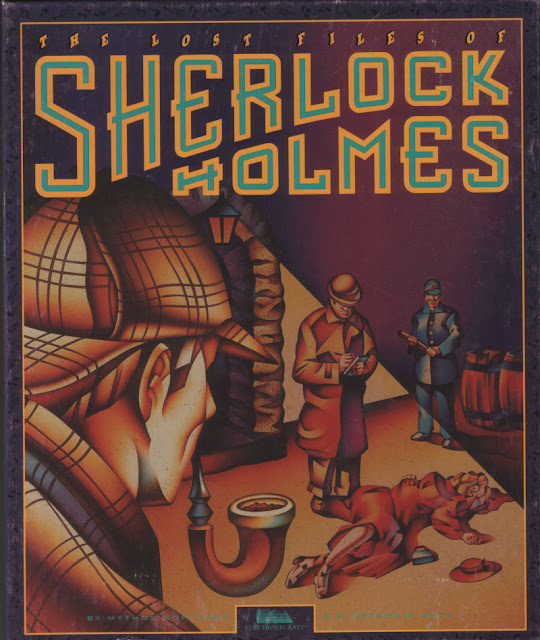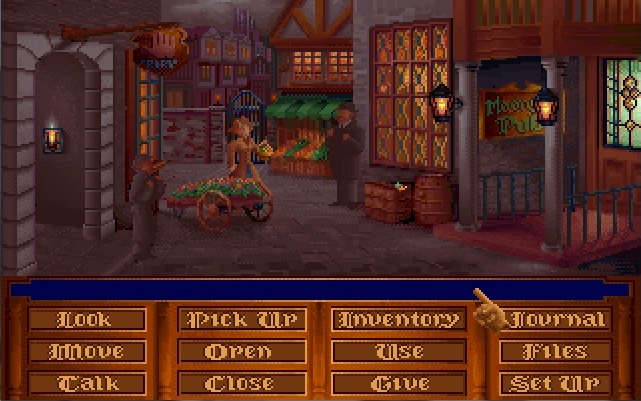The Lost Files of Sherlock Holmes: The Case of the Serrated Scalpel

Developed by Mythos Software, Inc., and released by Electronic Arts Ltd. for Dos in the autumn of 1992, The Lost Files of Sherlock Holmes: The Case of the Serrated Scalpel is a point-and-click adventure game featuring the most famous fictional detective of all time.

For me, point-and-click adventure games--a genre where the player mouse-clicks in a computer-simulated environment to perform actions--began with The Lost Files of Sherlock Holmes: The Case of the Serrated Scalpel. Back in the late 80's, I convinced my parents to buy a PC on the basis that they could do lots of important, adult-like things with it, like straightening the finances or making schedules. Of course, I had a huge ulterior motive--to play many of the awesome new video games I was hearing about, I needed a computer.
 |
| Above: An actual photo of my family going out to buy a computer. |
Somehow, I convinced those suckers to shell out big money to go along with my plan, and the lazy-old empty desk in our den was suddenly forced to become a hard-working, load-bearing piece of furniture.
 |
| Just like that lard-ass, Watson. |
For some reason, I could more easily convince my parents to pick up a computer game for me if it had an educational hook. My NES was seen as more of an entertainment machine--the computer was for learning--but I soon branched out into sports games...and then others.
In those days I had several heroes. Their first names were Indiana, Angus, and Sherlock. When I saw an ad for an upcoming DOS-based Sherlock Holmes game, I was immediately sold. Even better, the game was going to be released in time for the Christmas of 1992...and Christmas presents don't have to be educational! I asked for and received The Lost Files of Sherlock Holmes: The Case of the Serrated Scalpel, and that event, as well as generally that entire Christmas break, is seared into my memory. This is mostly due to the fact that I picked up an insanely nasty case of bronchitis and spent most of that two weeks in a dopamine-fueled fever dream (in which I watched the film Batman Returns an infinite amount of times), but that is a tale for another time. Now it is time to talk about The Lost Files of Sherlock Holmes: The Case of the Serrated Scalpel. It's online for free on just about any abandonware site you can find. For the first time in 24 years, I've played through it again. How does it stack up today?
 |
| The boys are back in town again. |
I remember being amazed at ...The Case of the Serrated Scalpel's graphical detail in 1992. The original game had to be downloaded to PC from FOURTEEN floppy disks, so they were obviously full of data. Playing the game now, though its pixelation may seem primitively retro, the detail still seems quite high. It is incredible how much atmosphere the developers were able to cram into this now ancient game. The Victorian England setting feels pitch-perfect. Character animation is also nicely done and as lifelike as pixelated 1992 computer figures can be. The same goes for the small amount of environmental animations like wind effect or fire flickering. Also appreciated is the more highly-detailed zoom in on the face of a character when they speak. While many 24-year old computer games might be an eyesore, ...Serrated Scalpel's look is charming.
 |
| As charming as a globe full of booze! |
Thankfully, this bit of timeless charm extends to the challenging, but not overly difficult gameplay. The Case of the Serrated Scalpel uses an interface not-unlike that of the Lucasarts adventure games of the time (Yes, I know Maniac Mansion came out before this! ...and yes, I did actually play that one first, at the only other person who had a computer in Pointe Coupee Parish's house.). The bottom third of the screen contains a well-structured list of commands the player can command Sherlock to perform (while Watson watches and offers moral support). For instance, by clicking "Open," on the lower menu, then clicking on a door or other openable object on the screen above, Sherlock can attempt to open said object. Along the way, Sherlock can do the same with objects he has earlier picked up and placed in his inventory. These objects can easily be accessed by clicking the menu button..."Inventory."
 |
| No something, Sherlock. |
 |
| This close. Story of my life. |
However, ...The Serrated Scalpel has a leg up on its competition: Its storytelling and mystery are worthy of Arthur Conan Doyle himself, and as the player exercises their detective skills and closes in on the murderer, there's a palpable thrill in the sense of accomplishment. This is enhanced by the game's wily dialogue and witty, in depth descriptions of the hundreds of environmental objects Holmes can investigate.
 |
| Yeah, he's not my favorite impressionist either, Sherlock. |
They are immersive, one part history and decor lesson, and part wink at the Sherlock Holmes fan. I've played other games based on Holmes (though not yet this game's direct sequel!), and none of them come close to ...Serrated Scalpel's sense of authenticity. The game is a real treat for adventure and Sherlock Holmes fans alike.
However, it does have one minor deficiency.
 |
| WOAH, WOAH, WOAH, calm down, I said "minor!" |
The audio component of the game doesn't quite holdup as well as its other qualities. When I originally played ...Serrated Scalpel, the old family computer didn't have a fancy enough soundcard to broadcast the game's sound. I played this whole thing in silence. That was a surreal and strangely imaginative experience. This time around, though, I've heard all the game has to offer... and it's actually not a lot. Two moments in the game have voice acting, and it isn't badly done... it's just that it only happens twice. There are minimal sound effects: some doors make a fairly realistic opening sound when opened or shut, and some are strangely silent. If an object is dropped, it generally makes a sound. Otherwise, nothing. This game would be even more immersive if the creators could have gotten in more ambient sounds, like that of a roaring fire in many of the posh Victorian locations, or the sounds of birds or the wind outdoors. Instead, there's nothing... well, almost nothing. Also, this review is dedicated to the ellipsis. Keep that dream trailing off, ellipsis...
 |
| "Silent Fire" is actually the name of my Creed cover band. |
...Serrated Scalpel does include a musical soundtrack, generally composed of a minute long piece, unique to each of the game's dozens of locations, which plays when Holmes and Watson enter, does not loop, and then leaves the player in silence. The music isn't bad, somewhere between NES and SNES in quality, generally sounding like a classical piece played in MIDI. For the most part, it's nothing to write home about, either.
 |
| Unfortunately, in regard to me, that last sentence is usually preceded by the phrase, "In bed..." |
When The Lost Files... was released, it took my feeble young mind months to solve. This time, admittedly with the aid of memories, albeit crackly, lo-fidelity ones, I finished the game in less than a week, playing about 90-minutes a day. Still, it feels like it goes on just as long as it should.
 |
| A phrase I hope will one day be in reference to me "in bed." Also, maybe this isn't the best caption for this picture. |
I really love this game. It hits a sweet spot between nostalgia and taste for me like few games can. It's almost like my coming of age game, so this review is probably really biased and you shouldn't listen to any of it, especially the stuff I said about myself in bed.
 |
| This review is a crime scene for the death of objectivity. |


Comments
Post a Comment